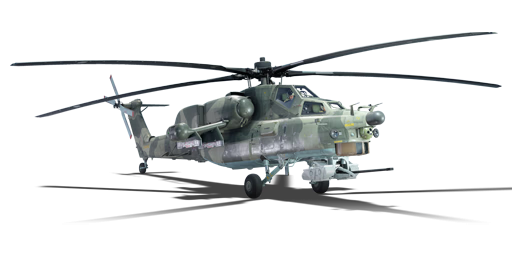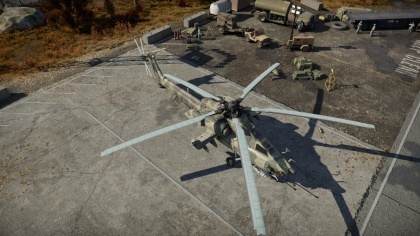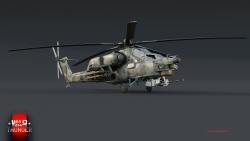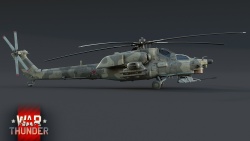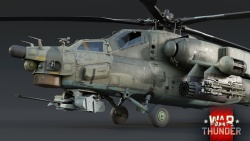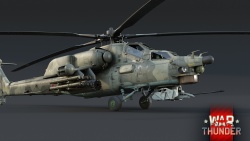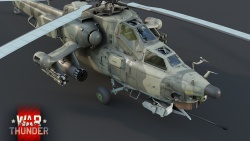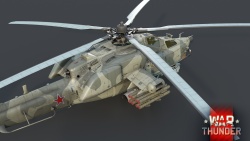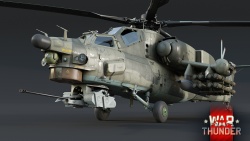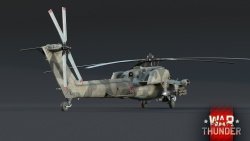Difference between revisions of "Mi-28N"
m (→Flight performance) (Tag: Visual edit) |
(Edits) |
||
| Line 4: | Line 4: | ||
<!-- ''In the description, the first part should be about the history of and the creation and combat usage of the helicopter, as well as its key features. In the second part, tell the reader about the helicopter in the game. Insert a screenshot of the vehicle, so that if the novice player does not remember the vehicle by name, he will immediately understand what kind of vehicle the article is talking about.'' --> | <!-- ''In the description, the first part should be about the history of and the creation and combat usage of the helicopter, as well as its key features. In the second part, tell the reader about the helicopter in the game. Insert a screenshot of the vehicle, so that if the novice player does not remember the vehicle by name, he will immediately understand what kind of vehicle the article is talking about.'' --> | ||
[[File:GarageImage_{{PAGENAME}}.jpg|420px|thumb|left]] | [[File:GarageImage_{{PAGENAME}}.jpg|420px|thumb|left]] | ||
| − | {{ | + | {{Break}} |
| − | The '''{{Specs|name}}''' is a rank {{Specs|rank}} Soviet helicopter {{Battle-rating}}. It was introduced in [[Update 1.93 "Shark Attack"]]. | + | The '''{{Specs|name}}''' is a rank {{Specs|rank}} Soviet attack helicopter {{Battle-rating}}. It was introduced in [[Update 1.93 "Shark Attack"]]. |
== General info == | == General info == | ||
| Line 18: | Line 18: | ||
|- | |- | ||
! colspan="2" | Max Speed<br>(km/h at 1,000 m) | ! colspan="2" | Max Speed<br>(km/h at 1,000 m) | ||
| − | ! rowspan="2" | Max altitude<br>( | + | ! rowspan="2" | Max altitude<br>(metres) |
|- | |- | ||
! AB !! RB | ! AB !! RB | ||
|- | |- | ||
| − | | | + | | 280 || 267 || 5,400 <!-- {{Specs|ceiling}} --> |
|- | |- | ||
! colspan="3" | ''Upgraded'' | ! colspan="3" | ''Upgraded'' | ||
|- | |- | ||
! colspan="2" | Max Speed<br>(km/h at 1,000 m) | ! colspan="2" | Max Speed<br>(km/h at 1,000 m) | ||
| − | ! rowspan="2" | Max altitude<br>( | + | ! rowspan="2" | Max altitude<br>(metres) |
|- | |- | ||
! AB !! RB | ! AB !! RB | ||
|- | |- | ||
| − | | ??? || | + | | ??? || 300 || 5,400 <!-- {{Specs|ceiling}} --> |
|- | |- | ||
|} | |} | ||
| Line 40: | Line 40: | ||
== Armaments == | == Armaments == | ||
=== Offensive armament === | === Offensive armament === | ||
| − | ''Describe the offensive armament of the aircraft, if any. Describe how effective the cannons and machine guns are in a battle, and also what belts or drums are better to use. If there is no offensive weaponry, delete this subsection.'' | + | <!-- ''Describe the offensive armament of the aircraft, if any. Describe how effective the cannons and machine guns are in a battle, and also what belts or drums are better to use. If there is no offensive weaponry, delete this subsection.'' --> |
| + | {{main|2A42 (30 mm)}} | ||
| + | |||
| + | The '''''{{PAGENAME}}''''' is armed with: | ||
| + | * A choice between two presets: | ||
| + | ** 1 x 30 mm 2A42 cannon, chin turret (450 rpg) | ||
| + | ** 1 x 30 mm 2A42 cannon, chin turret (450 rpg) + 128 x Flares | ||
=== Suspended armament === | === Suspended armament === | ||
| − | ''Describe the aircraft's suspended armament: additional cannons under the wings, bombs, rockets and torpedoes. This section is especially important for bombers and attackers. If there is no suspended weaponry remove this subsection.'' | + | <!-- ''Describe the aircraft's suspended armament: additional cannons under the wings, bombs, rockets and torpedoes. This section is especially important for bombers and attackers. If there is no suspended weaponry remove this subsection.'' --> |
| + | {{main|S-13DF|S-8KO|9M120M Ataka|9M39 Igla|GSh-23-2 (23 mm)}} | ||
| − | + | The '''''{{PAGENAME}}''''' can be outfitted with the following ordnance: | |
| − | '' | + | * Without load |
| + | * 80 x S-8KO rockets | ||
| + | * 20 x S-13DF rockets | ||
| + | * 8 x 9M120M Ataka missiles | ||
| + | * 40 x S-8KO rockets + 8 x 9M120M Ataka missiles | ||
| + | * 10 x S-13DF rockets + 8 x 9M120M Ataka missiles | ||
| + | * 16 x 9M120M Ataka missiles | ||
| + | * 40 x S-8KO rockets + 16 x 9M120M Ataka missiles | ||
| + | * 10 x S-13DF rockets + 16 x 9M120M Ataka missiles | ||
| + | * 8 x 9M39 Igla missiles | ||
| + | * 40 x S-8KO rockets + 8 x 9M39 Igla missiles | ||
| + | * 10 x S-13DF rockets + 8 x 9M39 Igla missiles | ||
| + | * 2 x 23 mm GSh-23-2 cannons | ||
| + | * 40 x S-8KO rockets + 2 x 23 mm GSh-23-2 cannons | ||
| + | * 10 x S-13DF rockets + 2 x 23 mm GSh-23-2 cannons | ||
| + | * 8 x 9M120M Ataka missiles + 2 x 23 mm GSh-23-2 cannons | ||
| + | * 16 x 9M120M Ataka missiles + 2 x 23 mm GSh-23-2 cannons | ||
| + | * 8 x 9M39 Igla missiles + 2 x 23 mm GSh-23-2 cannons | ||
| + | * 40 x S-8KO rockets + 8 x 9M120M Ataka missiles + 4 x 9M39 Igla missiles | ||
| + | * 8 x 9M120M Ataka missiles + 4 x 9M39 Igla missiles + 2 x 23 mm GSh-23-2 cannons | ||
| + | * 10 x S-13DF rockets + 8 x 9M120M Ataka missiles + 4 x 9M39 Igla missiles | ||
== Usage in battles == | == Usage in battles == | ||
| − | ''Describe the tactics of playing in a helicopter, the features of using | + | ''Describe the tactics of playing in a helicopter, the features of using helicopter in a team and advice on tactics. Refrain from creating a "guide" - do not impose a single point of view, but instead, give the reader food for thought. Examine the most dangerous enemies and give recommendations on fighting them. If necessary, note the specifics of the game in different modes (AB, RB, SB).'' |
| + | |||
| + | === Modules === | ||
| + | {| class="wikitable" | ||
| + | ! Tier | ||
| + | ! colspan="2" | Flight performance | ||
| + | ! Survivability | ||
| + | ! colspan="3" | Weaponry | ||
| + | |- | ||
| + | | I | ||
| + | | Compressor | ||
| + | | | ||
| + | | Flak jacket | ||
| + | | Offensive 30 mm | ||
| + | | B-13L | ||
| + | | MAW | ||
| + | |- | ||
| + | | II | ||
| + | | | ||
| + | | | ||
| + | | Helicopter frame | ||
| + | | New 30 mm cannons | ||
| + | | APU-8/4-U 4 Ataka | ||
| + | | | ||
| + | |- | ||
| + | | III | ||
| + | | Engine | ||
| + | | Replacing helicopter blades | ||
| + | | NVD | ||
| + | | Gun pod UPK-23-250 | ||
| + | | APU-8/4-U 8 Ataka | ||
| + | | | ||
| + | |- | ||
| + | | IV | ||
| + | | | ||
| + | | | ||
| + | | Cover | ||
| + | | | ||
| + | | 9M39 | ||
| + | | | ||
| + | |- | ||
| + | |} | ||
=== Pros and cons === | === Pros and cons === | ||
| Line 55: | Line 123: | ||
'''Pros:''' | '''Pros:''' | ||
| − | |||
* | * | ||
'''Cons:''' | '''Cons:''' | ||
| − | |||
* | * | ||
== History == | == History == | ||
| − | <!--''Describe the history of the creation and combat usage of the helicopter in more detail than in the introduction. If the historical reference turns out to be too long, take it to a separate article, taking a link to the article about the vehicle and adding a block "/History" (example: <nowiki>https://wiki.warthunder.com/(Vehicle-name)/History</nowiki>) and add a link to it here using the <code>main</code> template. Be sure to reference text and sources by using <code><nowiki><ref></ref></nowiki></code>, as well as adding them at the end of the article with <code><nowiki><references /></nowiki></code>. This section may also include the vehicle's dev blog entry (if applicable) and the in-game encyclopedia description (under <code><nowiki>=== In-game description ===</nowiki></code>, also if applicable).''--> | + | <!-- ''Describe the history of the creation and combat usage of the helicopter in more detail than in the introduction. If the historical reference turns out to be too long, take it to a separate article, taking a link to the article about the vehicle and adding a block "/History" (example: <nowiki>https://wiki.warthunder.com/(Vehicle-name)/History</nowiki>) and add a link to it here using the <code>main</code> template. Be sure to reference text and sources by using <code><nowiki><ref></ref></nowiki></code>, as well as adding them at the end of the article with <code><nowiki><references /></nowiki></code>. This section may also include the vehicle's dev blog entry (if applicable) and the in-game encyclopedia description (under <code><nowiki>=== In-game description ===</nowiki></code>, also if applicable).'' --> |
| + | Following the introduction into service of the Mil Mi-24 ''Hind'', design work began on an optimised attack helicopter with reduced secondary transport capacities, intended for a primary anti-armour and anti-helicopter role as well as providing aerial cover for helicopter landings. Following a number of proposed concepts, a preliminary design was chosen in 1977. Following the construction of a mock-up, a prototype was constructed and first flew on November 10th 1982, with a second prototype completed in 1983. Trials of the Mi-28 began in 1984, but the type lost out to the Kamov Ka-50. Despite this, lower priority development of the Mi-28 continued and production of the Mi-28 was approved in December of 1987. In January of 1988, the first prototype Mi-28A flew, fitted with more powerful engines and a different model of tail rotor; this prototype was first shown to the Western world at the 1989 Paris Air Show. In 1991 a second prototype of the Mi-28A flew, but with the end of the Cold War, the end of the Soviet Union and ensuing cuts in the Defence budget, the Mi-28A was re-evaluated and found inferior to the Ka-50, especially due to it lacking all-weather capabilities. As such, the Ka-50A was cancelled in 1993. | ||
| − | + | The Mi-28N was first presented in 1995 and first flew on November 14th 1996. Unlike the preceding Mi-28A, the Mi-28N was fitted with a whole array of vision aids, such as radar, a gun camera and forward-looking infrared (FLIR), giving it an all-weather capability. Once again, the post-Cold War realities in the Russian Federation meant that funds were not available and the program was given a low priority. | |
| − | + | This changed in 2000 when attention was given to re-equipping the Russian Army. The Mi-28N was given a new priority, as a future replacement of the Mi-24. In 2004, a second prototype with an altered main rotor design was flown, and after trials, the first production Mi-28N was accepted by the Russian military on June 5th 2006, with the type being declared operational in October 2009. An export model, the Mi-28NE, has since been sold to both Iraq and Algeria. An updated model, the Mi-28NM, was first flown in 2016, with the first production examples delivered to the Russian military in June of 2019. | |
| − | |||
| − | This changed in 2000 when attention was given to re-equipping the Russian Army. | ||
== Media == | == Media == | ||
| − | <!--''Excellent additions to the article would be video guides, screenshots from the game, and photos.''--> | + | <!-- ''Excellent additions to the article would be video guides, screenshots from the game, and photos.'' --> |
| − | |||
;Images | ;Images | ||
<div><ul> | <div><ul> | ||
| Line 88: | Line 152: | ||
== See also == | == See also == | ||
''Links to the articles on the War Thunder Wiki that you think will be useful for the reader, for example:'' | ''Links to the articles on the War Thunder Wiki that you think will be useful for the reader, for example:'' | ||
| − | |||
* ''reference to the series of the helicopter;'' | * ''reference to the series of the helicopter;'' | ||
* ''links to approximate analogues of other nations and research trees.'' | * ''links to approximate analogues of other nations and research trees.'' | ||
== External links == | == External links == | ||
| − | <!--''Paste links to sources and external resources, such as:'' | + | <!-- ''Paste links to sources and external resources, such as:'' |
* ''topic on the official game forum;'' | * ''topic on the official game forum;'' | ||
* ''encyclopedia page on the helicopter;'' | * ''encyclopedia page on the helicopter;'' | ||
| − | * ''other literature.''--> | + | * ''other literature.'' --> |
| − | + | * [[wt:en/news/6436-development-mi-28n-incoming-havoc-en|[Development] Mi-28N - Incoming Havoc]] | |
| − | * [ | ||
{{AirManufacturer Mil}} | {{AirManufacturer Mil}} | ||
{{USSR helicopters}} | {{USSR helicopters}} | ||
Revision as of 11:47, 4 February 2020
Contents
Description
The Mi-28N is a rank VII Soviet attack helicopter
with a battle rating of 10.7 (AB/SB) and 11.0 (RB). It was introduced in Update 1.93 "Shark Attack".
General info
Flight performance
Describe how the helicopter behaves in the air. Speed, manoeuvrability, acceleration and allowable loads - these are the most important characteristics of the vehicle.
| Characteristics | ||
|---|---|---|
| Stock | ||
| Max Speed (km/h at 1,000 m) |
Max altitude (metres) | |
| AB | RB | |
| 280 | 267 | 5,400 |
| Upgraded | ||
| Max Speed (km/h at 1,000 m) |
Max altitude (metres) | |
| AB | RB | |
| ??? | 300 | 5,400 |
Survivability and armour
Examine the survivability of the helicopter. Note how vulnerable the structure is and how secure the pilot is, whether the fuel tanks are armoured, etc. Describe the armour, if there is any, and also mention the vulnerability of other critical systems.
Armaments
Offensive armament
The Mi-28N is armed with:
- A choice between two presets:
- 1 x 30 mm 2A42 cannon, chin turret (450 rpg)
- 1 x 30 mm 2A42 cannon, chin turret (450 rpg) + 128 x Flares
Suspended armament
The Mi-28N can be outfitted with the following ordnance:
- Without load
- 80 x S-8KO rockets
- 20 x S-13DF rockets
- 8 x 9M120M Ataka missiles
- 40 x S-8KO rockets + 8 x 9M120M Ataka missiles
- 10 x S-13DF rockets + 8 x 9M120M Ataka missiles
- 16 x 9M120M Ataka missiles
- 40 x S-8KO rockets + 16 x 9M120M Ataka missiles
- 10 x S-13DF rockets + 16 x 9M120M Ataka missiles
- 8 x 9M39 Igla missiles
- 40 x S-8KO rockets + 8 x 9M39 Igla missiles
- 10 x S-13DF rockets + 8 x 9M39 Igla missiles
- 2 x 23 mm GSh-23-2 cannons
- 40 x S-8KO rockets + 2 x 23 mm GSh-23-2 cannons
- 10 x S-13DF rockets + 2 x 23 mm GSh-23-2 cannons
- 8 x 9M120M Ataka missiles + 2 x 23 mm GSh-23-2 cannons
- 16 x 9M120M Ataka missiles + 2 x 23 mm GSh-23-2 cannons
- 8 x 9M39 Igla missiles + 2 x 23 mm GSh-23-2 cannons
- 40 x S-8KO rockets + 8 x 9M120M Ataka missiles + 4 x 9M39 Igla missiles
- 8 x 9M120M Ataka missiles + 4 x 9M39 Igla missiles + 2 x 23 mm GSh-23-2 cannons
- 10 x S-13DF rockets + 8 x 9M120M Ataka missiles + 4 x 9M39 Igla missiles
Usage in battles
Describe the tactics of playing in a helicopter, the features of using helicopter in a team and advice on tactics. Refrain from creating a "guide" - do not impose a single point of view, but instead, give the reader food for thought. Examine the most dangerous enemies and give recommendations on fighting them. If necessary, note the specifics of the game in different modes (AB, RB, SB).
Modules
| Tier | Flight performance | Survivability | Weaponry | |||
|---|---|---|---|---|---|---|
| I | Compressor | Flak jacket | Offensive 30 mm | B-13L | MAW | |
| II | Helicopter frame | New 30 mm cannons | APU-8/4-U 4 Ataka | |||
| III | Engine | Replacing helicopter blades | NVD | Gun pod UPK-23-250 | APU-8/4-U 8 Ataka | |
| IV | Cover | 9M39 | ||||
Pros and cons
Summarise and briefly evaluate the vehicle in terms of its characteristics and combat effectiveness. Mark its pros and cons in the bulleted list. Try not to use more than 6 points for each of the characteristics. Avoid using categorical definitions such as "bad", "good" and the like - use substitutions with softer forms such as "inadequate" and "effective".
Pros:
Cons:
History
Following the introduction into service of the Mil Mi-24 Hind, design work began on an optimised attack helicopter with reduced secondary transport capacities, intended for a primary anti-armour and anti-helicopter role as well as providing aerial cover for helicopter landings. Following a number of proposed concepts, a preliminary design was chosen in 1977. Following the construction of a mock-up, a prototype was constructed and first flew on November 10th 1982, with a second prototype completed in 1983. Trials of the Mi-28 began in 1984, but the type lost out to the Kamov Ka-50. Despite this, lower priority development of the Mi-28 continued and production of the Mi-28 was approved in December of 1987. In January of 1988, the first prototype Mi-28A flew, fitted with more powerful engines and a different model of tail rotor; this prototype was first shown to the Western world at the 1989 Paris Air Show. In 1991 a second prototype of the Mi-28A flew, but with the end of the Cold War, the end of the Soviet Union and ensuing cuts in the Defence budget, the Mi-28A was re-evaluated and found inferior to the Ka-50, especially due to it lacking all-weather capabilities. As such, the Ka-50A was cancelled in 1993.
The Mi-28N was first presented in 1995 and first flew on November 14th 1996. Unlike the preceding Mi-28A, the Mi-28N was fitted with a whole array of vision aids, such as radar, a gun camera and forward-looking infrared (FLIR), giving it an all-weather capability. Once again, the post-Cold War realities in the Russian Federation meant that funds were not available and the program was given a low priority.
This changed in 2000 when attention was given to re-equipping the Russian Army. The Mi-28N was given a new priority, as a future replacement of the Mi-24. In 2004, a second prototype with an altered main rotor design was flown, and after trials, the first production Mi-28N was accepted by the Russian military on June 5th 2006, with the type being declared operational in October 2009. An export model, the Mi-28NE, has since been sold to both Iraq and Algeria. An updated model, the Mi-28NM, was first flown in 2016, with the first production examples delivered to the Russian military in June of 2019.
Media
- Images
See also
Links to the articles on the War Thunder Wiki that you think will be useful for the reader, for example:
- reference to the series of the helicopter;
- links to approximate analogues of other nations and research trees.
External links
| Mil Moscow Helicopter Plant | |
|---|---|
| Attack | Mi-4AV |
| Mi-8AMTSh · Mi-8AMTSh-VN · Mi-8TV | |
| Mi-24A · Mi-24P · Mi-24V | |
| Mi-28N · Mi-28NM | |
| Mi-35M | |
| Export | ◊Mi-8TB |
| ▂Mi-24D · ◔Mi-24D · ◔Mi-24V · ◔Mi-24P · ◊Mi-24P · ◄Mi-24P HFS 80 · Superhind | |
| Mi-28A | |
| ▄Mi-35M | |
| USSR helicopters | |
|---|---|
| Attack | |
| Hound | Mi-4AV |
| Hip | Mi-8AMTSh · Mi-8AMTSh-VN · Mi-8TV |
| Hind | Mi-24A · ▂Mi-24D · Mi-24P · Mi-24V · Mi-35M |
| Havoc | Mi-28N · Mi-28NM |
| Helix | Ka-29 |
| Hokum | Ka-50 · Ka-52 |


